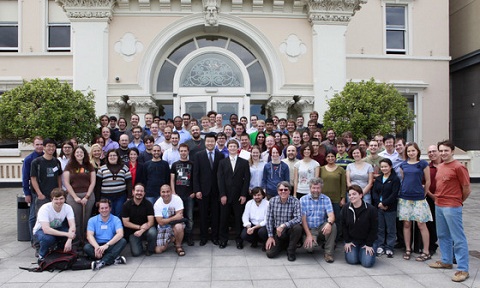ACADEMIA
Third Annual HPC Summer School welcomes 60 students from 4 continents
From more than 230 applications, 60 graduate students and postdocs – among them 30% women – were selected from higher education institutions across Europe and the United States to attend the 3rd Annual Summer School on Computational Challenges in High Performance Computing hosted by the Partnership for Advanced Computing in Europe (PRACE) and the Extreme Science and Engineering Discovery Environment (XSEDE) from June 24 to 28, 2012. The students came together at the Royal Marine Hotel in south Dublin, Ireland, where the Irish Centre for High-End Computing (ICHEC), the Irish member of PRACE, took care of local coordination and hospitality. The nationalities of the students spanned several continents including Asia, Europe, the Middle East, Central and North America.
This was the third in an on-going series of summer schools jointly organized by PRACE and XSEDE with funding from the European Commission (EC) and the United States National Science Foundation (NSF). The goals of the summer school series are to expand the knowledge of the attendees about high performance computing (HPC) and its applications in multiple fields of science, technology, engineering and mathematics. The summer school stimulates international collaborations and friendships among the attendees and presenters through the unique global set-up of such a summer school.
The 2012 participants were engaged in learning about:
- Long-term trends and strategies for advancing scientific discovery
- Availability of PRACE and XSEDE cyberinfrastructure in Europe and the United States to support computational science research and education
- Challenges and solutions for conducting leading-edge research across multiple fields of study
- Scientific programming & software development strategies
- Performance analysis & profiling
- Algorithmic approaches & numerical libraries
- Data intensive supercomputing
- Scientific visualization
The attendees were immersed in a mix of presentations and hands-on sessions held by more than 20 leading researchers and HPC professionals from both sides of the Atlantic. The programme placed particular emphasis on how HPC is being applied to meet current and future computational challenges in various scientific disciplines, as well as the relevant tools and techniques for tackling different problems. Meals and social activities were coupled with mentoring to form an integral part of the school’s programme, which was designed and organized to promote interaction among the participants.
David Keyes from the Columbia University and KAUST, who gave the opening keynote presentation on Exascale Challenges, was honoured to participate in such an “elite activity”. He was particularly impressed with the selection of students and post-docs who attended the school. “They have diversity of gender, race, institutional rank, citizenship, and, of course, discipline and applications-enabling spectrum, but all are poised to benefit. By their affiliation and advisors and their short round-the-room introduction, they are clearly going to be the ones in whom to invest.” Frank Jenko from the Max Planck Institute for Plasma Physics and Ulm University, who gave the lecture on plasma physics, added: "The lectures and hands-on sessions covered a broad range of timely and highly interesting topics, and the quality of speakers was extraordinarily high. Numerous networking opportunities among the participants and lecturers sparked good discussions some of which may extend well into the future. Overall, it was a most useful and rewarding experience for everyone involved."
Additional information about the event is available at: https://www.xsede.org/web/summerschool12
Planning is now underway for the fourth 2013 HPC Summer School to be held around June 2013 in the United States. If you would like to be kept informed about the 2013 Summer School and other opportunities for advancing your HPC knowledge and skills, please contact the people below or visit the respective web sites.

